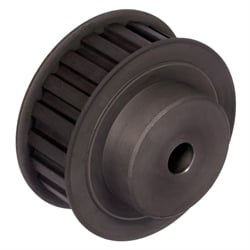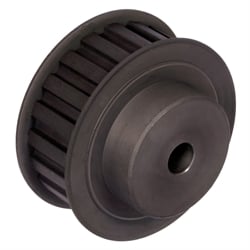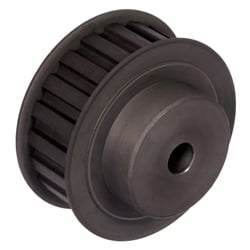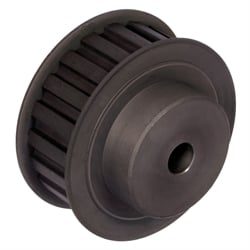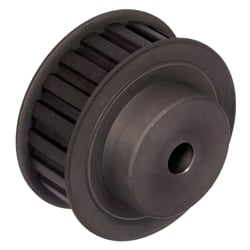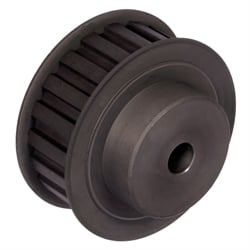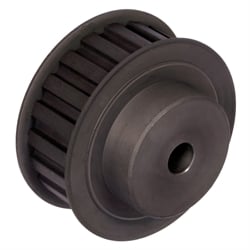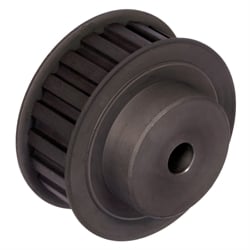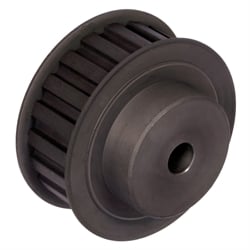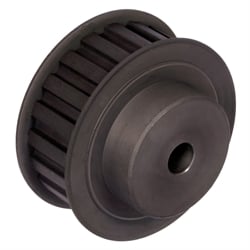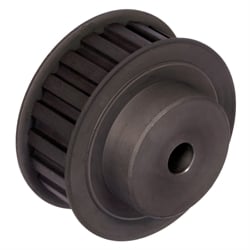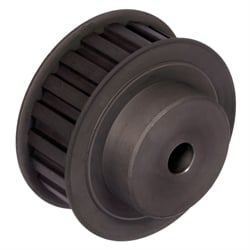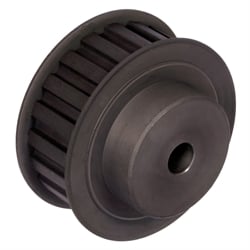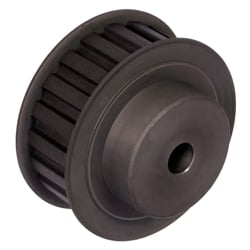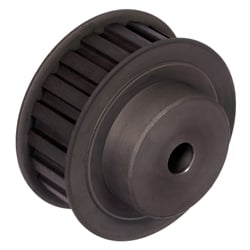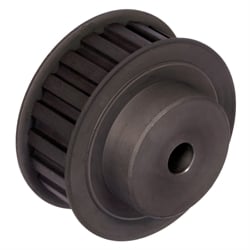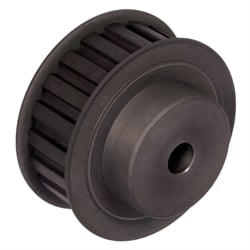Timing belt and pulley
Description
Timing belt drives ensure quiet operation and synchronous power transmission. Because they are maintenance-free, these drives are highly cost-effective. Due to changing requirements and considering the latest developments, there are a large number of different profiles, belt types, and pulleys available on the market. When non-positive drives (e.g., V-belt systems) are replaced, it is worth considering whether a conversion to a positive power transmission can be allowed from a safety perspective (some drives require slipping under overload). Selection and Sizing: The material of the belt and the type of timing belt must be chosen with consideration for the specific situation (e.g., required characteristics related to the machine or the environment). There are performance tables and a user-friendly calculation program to assist you in selecting the correct size. Small pulley diameters shorten the lifespan, and at least 6 teeth should be engaged at all times. When consulting the performance tables, various application-specific operating factors should be taken into account. Installation and Maintenance: At least one pulley must be equipped with flanges. The shafts must be parallel (deviation < +0.5°). The belt should not be overloaded during installation. Adequate adjustment options in the system should be provided for the assembly and adjustment of the ideal belt. Belt Tension: Each belt requires a certain pretension, depending on the type of belt, pulley diameter, center distance, and the tangential force to be transmitted. The total sum of tension and peripheral force should not exceed the allowed tensile strength of the belt. Belt tension is best adjusted by changing the center distance. Alternatively, a smooth idler pulley on the outside or a toothed one on the inside of the belt can be used for adjustment. Efficiency: Depending on the type of belt (flexibility) and the number of teeth on the pulley (bending), the efficiency can reach 98%. Belts with tension cords made of fiberglass (HTD and Inch) are particularly flexible.
Selection and sizing
The belt material and timing belt type must be chosen taking into account the specific situation (e.g. required characteristics related to the machine or the environment). There are performance tables and an easy-to-use calculation program to help you select the right size. Small pulley diameters shorten lifetime. And at least 6 teeth must be engaged at any time. When consulting the performance tables, several application-specific operating factors must be taken into account.
Assembly and maintenance
At least one pulley must be equipped with flanges. The axes must be parallel (deviation < +0.5°). The belt must not be overloaded during installation. For mounting and adjustment of the ideal belt, sufficient adjustment options must be provided in the system..
Belt tension
Each belt requires a certain pretension, depending on the type of belt, the diameter of the pulleys, the center distance and the tangential force to be transmitted. The total sum of the tension and the peripheral force must not exceed the permitted tensile force of the belt. The belt tension can best be adjusted by changing the center distance. Otherwise, a smooth idler pulley on the outside or a toothed one on the inside of the belt can be used for adjustment..
Efficiency
Depending on the type of belt (flexibility) and the number of teeth on the pulley (bending), the degree of efficiency can reach 98%. Belts with tensile bands made of fiberglass cords (HTD and Inch) are particularly flexible..
Some products from this category
| Product | Description | PICTURE |
|---|---|---|
| Products | ||
|---|---|---|
|
18231700
Maedler Timing belt pulley L material steel 17 teeth for belt width 100=25.4mm |
||
|
18231800
Maedler Timing belt pulley L material steel 18 teeth for belt width 100=25.4mm |
||
|
18237200
Maedler Timing belt pulley L material grey cast iron 72 teeth for belt width 100=25.4mm |
||
|
18233500
Maedler Timing belt pulley L material steel 35 teeth for belt width 100=25.4mm |
||
|
18238400
Maedler Timing belt pulley L material grey cast iron 84 teeth for belt width 100=25.4mm |
||
|
18231900
Maedler Timing belt pulley L material steel 19 teeth for belt width 100=25.4mm |
||
|
18232000
Maedler Timing belt pulley L material steel 20 teeth for belt width 100=25.4mm |
||
|
18232100
Maedler Timing belt pulley L material steel 21 teeth for belt width 100=25.4mm |
||
|
18232200
Maedler Timing belt pulley L material steel 22 teeth for belt width 100=25.4mm |
||
|
18232300
Maedler Timing belt pulley L material steel 23 teeth for belt width 100=25.4mm |
||
|
18232400
Maedler Timing belt pulley L material steel 24 teeth for belt width 100=25.4mm |
||
|
18232500
Maedler Timing belt pulley L material steel 25 teeth for belt width 100=25.4mm |
||
|
18232600
Maedler Timing belt pulley L material steel 26 teeth for belt width 100=25.4mm |
||
|
18232700
Maedler Timing belt pulley L material steel 27 teeth for belt width 100=25.4mm |
||
|
18232800
Maedler Timing belt pulley L material steel 28 teeth for belt width 100=25.4mm |
||
|
18233000
Maedler Timing belt pulley L material steel 30 teeth for belt width 100=25.4mm |
||
|
18233200
Maedler Timing belt pulley L material steel 32 teeth for belt width 100=25.4mm |
||
|
18233300
Maedler Timing belt pulley L material steel 33 teeth for belt width 100=25.4mm |
||
|
18233400
Maedler Timing belt pulley L material steel 34 teeth for belt width 100=25.4mm |
||
|
18233600
Maedler Timing belt pulley L material steel 36 teeth for belt width 100=25.4mm |
||
Would you like to see more information?
Act in time only supports professional users.
Are you a private individual? Your machine's manufacturer likely has the necessary parts. We therefore recommend contacting the manufacturer directly for assistance.
